How to disable Java in your web browser
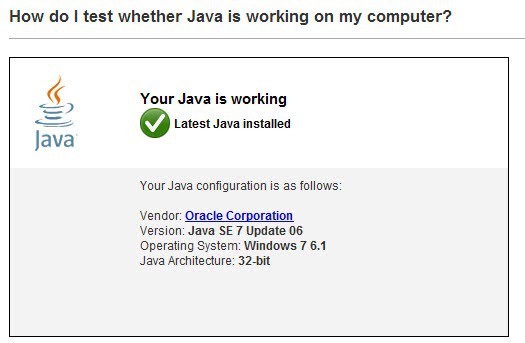
Update: Most web browsers don't support Java anymore. Firefox, Google Chrome, and Microsoft Edge don't support Java anymore and that means that you don't have to disable Java in the browser even if it is installed on the computer system as the browser's don't pick it up anymore. Still, some browsers do support Java and this guide still applies to them for the most part. End
By now you have probably heard about a new Java vulnerability that is been actively exploited on the Internet.
I do not want to rehash all that has been said, and would like to suggest articles on ZDnet and Securelist for that which should provide you with an overview of the threat. Only that much: only Java 7.x is affected by the vulnerability.
Visit the following website to find out which version of Java, if any, is installed on your computer. Note that the test may not work in all browsers and blocks some browsers, Firefox for instance, actively.
You may not get a reading here if you do not have Java installed, if you are using click to play in the browser, or if you have disabled Java.
Check the version on the page to find out which version of Java you have installed.
If that does not work, do the following instead on Windows:
- Tap on the Windows-key to display the Start menu.
- Type about Java and select the option.
- A small window opens that displays the Java version.
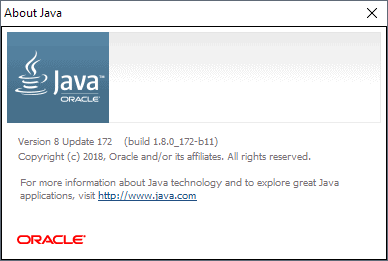
You have several options at your disposal to protect your system from active exploits if Java is still used by the browser.
- Uninstall Java. Without doubt the best option if you do not use desktop apps or web apps that require Java
- Disable Java. This needs to be done in every web browser that you use. More about that later.
- Disable Java content in the browser.
- Enable click to play. If your web browser supports click to play, you can enable the feature to block Java contents from being loaded automatically.
- Use a security extension that blocks scripts.
If you require Java, make sure it is always up to date. Here is how to avoid third-party offers during Java upgrades or installs.
Disabling Java in your web browser
Please note that you may see multiple Java listings, and that it is recommended to disable all that you find.
Internet Explorer: Here you need to change a Registry key. Press Windows-r, type in regedit and hit enter. Now navigate to the Registry key HKEY_CURRENT_USER\Software\Microsoft\Windows\CurrentVersion\Internet Settings\Zones\3Â and change the value of 1C00 to 0. More about the process here.
Some browsers that share code with Firefox still support NPAPI plugins. That is the case for Pale Moon for instance.
Old browser information
Google Chrome: Type chrome://plugins in the address bar and hit enter. This displays all plugins that the browser has found on your system. Some may be enabled, others disabled. Locate Java in the listing and click on the Disable link to disable the plugin in the browser. The disable link should turn into Enable, and the background color of the row to gray.
Mozilla Firefox: Type about:addons in the browser's address bar and hit enter. Switch to Plugins on the page that opens and locate Java here. Click on the disable button to disable Java in Firefox.
It should then read (disabled) after the name of the plugin.
Opera: Type opera:plugins in the browser's address bar and hit enter. Locate Java there and click on the disable links to disable the plugin.
The font color should turn to light gray and the link at the end of each line should read enable.
Closing Words
Java is installed on a lot of desktop systems even though most regular Internet users do not need the plugin or technology at all for their day to day activities. If you are not sure whether you need Java, I'd suggest to uninstall it and see if you are running into issues opening applications or contents on the Internet. Chance is, you won't.



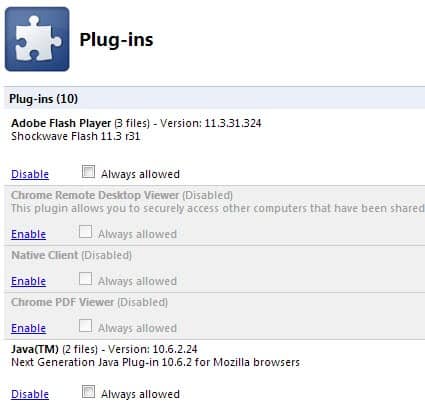
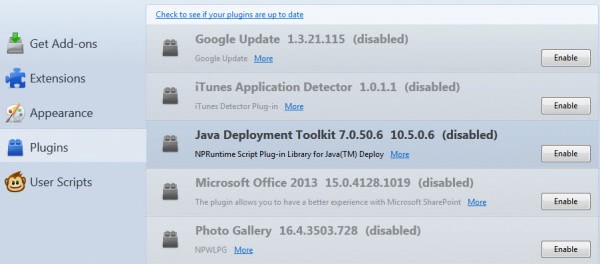
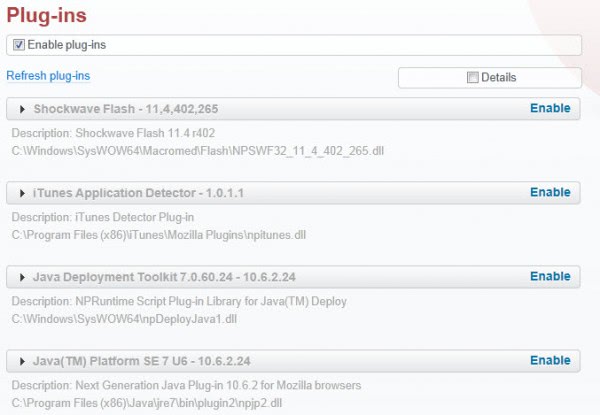




















I uninstalled Java few month ago and everything is fine. Only few websites with old games and IP checks use java now anyway.
Oracle has just released an update/fix for the problem with Java.
Should be good to go, until the next vulnerability!
https://threatpost.com/en_us/blogs/oracle-releases-fix-java-cve-2012-4681-flaw-083012
Nice but to late for me. I have uninstalled Java on all my systems.
Too late for me as well.
QUOTE from nakedsecurity ( http://preview.tinyurl.com/9o4gwjh )
“The bigger question is, “Do you really need Java?” If you can get by without it, you should. That is true for any application that interfaces with the internet. Fewer programs means fewer vulnerabilities.”
I don’t really need it.
A couple of days ago I too opted for the “uninstall Java altogether” route. So far so good; just one defunct software encountered: DirDup,- used for quick, manually activated differential backups.
My backup is daily, so I replaced DirDup with something that’s turned out to be pretty great: GFI Backup Freeware. Available at http://www.gfi.com/pages/backup-freeware.asp
This is giving me the opportunity to realize that, here, the system will work out well and better without Java, since no application is requiring it, at this time. I did encounter a few web apps (mainly testing sites) that pointed out lack of Java: yes, I removed it completely. If I ever reinstall it it won’t be before an update, not a patch, an update; and still, not sure.
Oracle as to what I’ve read was aware since last April of these problems among others. Frankly, if true, I just don’t understand their security policy. They are running after Java 8 when Java 7 is buggy : today’s world, typically.
Uninstalling java is the best option, but yes its true many of the softwares still relies on java, especially which i install from sourceforge.
Many have recommended to remove it…but is there any way to secure that application, so that it runs in sandbox mode and if it is exploited..it should not ruin system badly.. matt you discussed here about ASLR (address space layout randomisation) few days back..i haven’t tried it..have you tested any application with this tool, in which java is a primary requirement
computers suck.
One of the many reasons to search for alternatives for java written programs, I always try to avoid anything in .net, java and flash is rapidly becoming a problem, ever since adobe acquired out macromedia things just haven’t been the same. I also avoid anything adobe, corel and symantec.
Adobe and Symantec, for sure, but there’s nothing wrong with Corel.
Been using PSP for ages, without any issues!